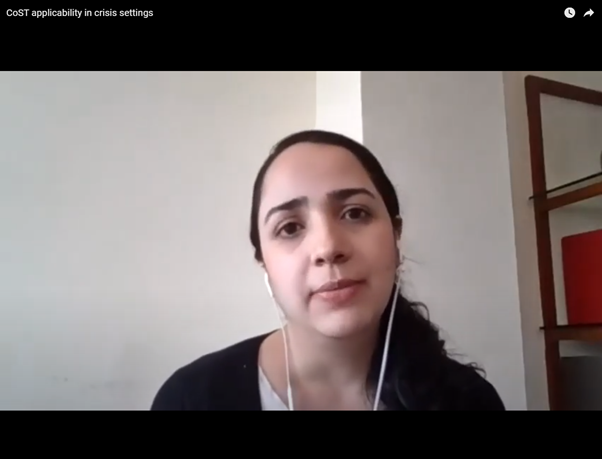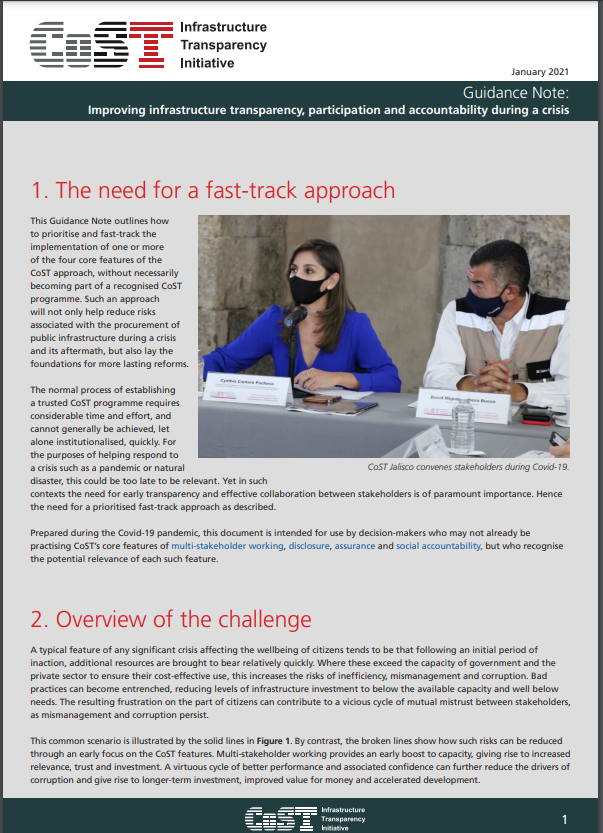Prior to the tumultuous events of 2020, CoST has been well familiar with operating in crisis settings, having been established during challenging times in Honduras, Ukraine and Uganda. In these contexts, adaptation of the initiative’s features gave CoST multi-stakeholder groups the means to rapidly improve infrastructure transparency and accountability and allow the programmes to flourish.
Our experience provides valuable insight to today’s crisis response. Throughout 2020, governments rapidly delivered essential connectivity and social infrastructure such as hospitals, health and sanitation facilities to meet demand. What would normally take years to deliver took a matter of months, and whilst the swift response was necessary it has frequently lacked transparency and accountability safeguards which, across many sectors, have resulted in predictable and negative consequences.
Today we publish guidance which shows how a rapid response need not exclude these vital safeguards which combat mismanagement, inefficiency and corruption in the sector. Ultimately, they will deliver the quality infrastructure, cost savings and trust now so evidently needed in crises.
The ‘fast-track’ approach in crises

Our new guidance note shows how CoST can be ‘fast-tracked’ by governments without a country or region necessarily becoming a member of CoST in the short term. In a series of steps, we emphasise achieving the ‘quick wins’ across CoST’s core features, multi-stakeholder working, disclosure, assurance and social accountability. This will ensure a quick response and open the pathway for broader reform in the long term.
Author of the guidance Hamish Goldie-Scot and CoST Honduras lead, Gracia Remirez explain more in this interview. This shows how adapting the CoST model ensured challenges faced by CoST Honduras have been overcome – both when initiated and now.
In 2014, the programme faced obstacles in its initiation including widespread mistrust of government, criminal violence and Hurricane Mitch. Today the programme celebrates many successes – winning prestigious OGP and Hackathon awards, exposing corruption, monitoring PPP projects and responding to the President’s call to apply CoST to new Covid health facilities.
What does the ‘fast-track’ approach look like?
The steps outlined in the note provide key guidance for how to gain government backing, assess the context and subsequently adapt CoST features to it. Importantly, they highlight how CoST assistance can mitigate unforeseen hurdles.
 1. Gain government support. This step emphasises identifying an advocate of CoST to champion its principles across government. This has been key to getting many programmes off the ground as shown by the example of Alfredo Cantero in Honduras. Securing government support, such as in the form of an endorsement from senior ministers or a decree can also play an intrinsic role in the longevity of infrastructure transparency.
1. Gain government support. This step emphasises identifying an advocate of CoST to champion its principles across government. This has been key to getting many programmes off the ground as shown by the example of Alfredo Cantero in Honduras. Securing government support, such as in the form of an endorsement from senior ministers or a decree can also play an intrinsic role in the longevity of infrastructure transparency.
2. Convene a rapid opportunity assessment. This stage helps to inform which of the proceeding steps should be focussed on, it outlines the ways and means of carrying out a stakeholder assessment, existing legal provisions and windows of opportunity.
3. Convene the right stakeholders. Here we emphasise establishing an interim multi-stakeholder group, comprising government, civil society and the private sector, to provide leadership and ensure the approach taken is credible and participatory.
4. Implement basic data disclosure. To achieve basic transparency with minimal effort, the quick win here concentrates on publishing basic data items from CoST standards in a digital format. Some of the basic items could include, for example, project purpose, cost and contractor name which can offer valuable insights over time.
5. Support basic assurance. CoST assurance is the process of verifying the disclosed data to highlight key issues. To ensure government can meet competing demands, we emphasise prioritising reliable, consistent data collection and clarification, whilst some aspects such as construction site visits could be omitted in the short term.
6. Support social accountability. Civic participation is especially pertinent in crisis to ensure scrutiny on the quick decisions. Thus, the quick wins here could include a focus on collaboration with civic actors who have direct and effective access to the public and to highlight issues such as how law or regulations are being applied in practice.
7. Review, consolidate and develop. This concentrates on reflection and adaptation – looking at the successes and strengthening these aspects where appropriate. For example, concerning disclosure an online disclosure platform could be established to enhance data centralisation, accessibility and subsequent transparency. Read more.
Using the window of opportunity
So that the immediate efforts applied in the crisis do not go to waste, our guidance concludes by showing what infrastructure transparency, participation and accountability could look like over the medium and long term. This underlines how broader reform can be secured, including joining CoST as a member and enabling impact at scale.
